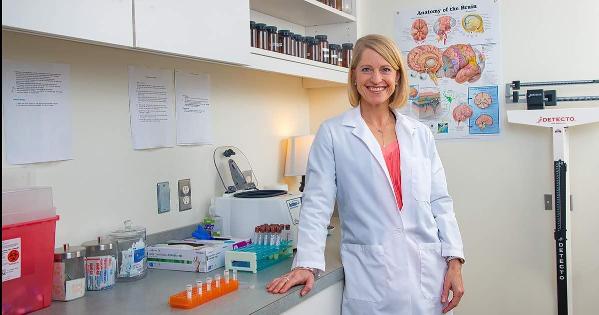The Power of the Diet

Widespread pain, fatigue, headaches, cognitive dysfunction, and gastrointestinal issues. These are some of the symptoms of the debilitating, chronic pain condition known as Gulf War Illness that afflicts many U.S. veterans who served during the Persian Gulf War of 1990-91. Now there is the promise of a dietary intervention that could help reduce veterans’ symptoms and provide some measure of relief from an illness for which there is no cure.
The U.S. Department of Defense has awarded College of Arts and Sciences Associate Professor of Health Studies and Neuroscience, Kathleen Holton, a grant of $6.4 million for a clinical trial to confirm the efficacy of the low-glutamate diet as a treatment for Gulf War Illness.
The clinical trial builds on a smaller study Holton conducted that showed positive results for 40 veterans who participated. The new study will recruit 160 veterans with diversity in race, gender and body mass index.
“We want to show that this diet will work for all veterans. In the previous study, the veterans suffered from, on average, more than 20 different symptoms,” Holton said. “We saw widespread symptom improvements in veterans with GWI after one month on the low-glutamate diet. Improvements were noted in every symptom area and included significant reductions in overall symptom number, with an average of nine symptoms going away. The veterans reported significant improvements in cognitive function and quality of life. The majority continued to follow the diet three months after study completion, suggesting continued improvement and good feasibility.”
Holton, a member of AU’s Center for Neuroscience and Behavior, explores how food additives contribute to neurological symptoms. The role of glutamate figures prominently in this work. Glutamate is a few things: it’s a key neurotransmitter in the brain; it occurs naturally in some foods; and it’s also created chemically and added to foods as a flavor enhancer. Glutamate is most often associated with monosodium glutamate, or MSG. However, the majority of people’s exposure comes from free glutamate in other food additives, or foods where it occurs naturally, such as soy sauce, fish sauce, seaweed, mushrooms and aged cheeses like parmesan.
When there’s too much glutamate in the nervous system, it acts as an excitotoxin that can disrupt brain signaling and kill cells. Other research has shown that glutamate is high in pain processing areas of the brain in individuals with fibromyalgia and migraine. High concentrations of glutamate have also been linked to some psychiatric illnesses as well as diseases such as multiple sclerosis and Parkinson’s. Reducing glutamate exposure, while also increasing consumption of micronutrients and antioxidants which protect against excitotoxicity, is the focus of Holton’s research.
“Over the years, I’ve met many veterans suffering from Gulf War Illness who were driven from pillar to post as they sought help or even just recognition that their plight was real,” said Max Paul Friedman, interim dean of the College of Arts and Sciences and professor of history and international relations. “Now superstar researcher Katie Holton has developed, on the basis of cutting-edge neuroscience, a safe, low-cost treatment that promises relief in ways that can potentially make a huge improvement in the quality of life of countless veterans. Dr. Holton is truly a changemaker for a changing world."
Origins of GWI
Soon after the end of the Persian Gulf War, veterans developed chronic conditions and a variety of symptoms and illnesses that defied explanation by established medicine, according to the DoD. The symptoms varied widely and included widespread pain, muscle aches, headache, persistent problems with memory and thinking, fatigue, breathing problems, stomach and intestinal symptoms, and skin abnormalities. In addition to the physical symptoms, changes in behavior and problems with interpersonal relationships frequently occurred, the DoD found.
GWI is estimated to affect 175,000 to 250,000 of the nearly 700,000 troops deployed during the war. The DoD also reports that GWI rates are high among those who served in areas in proximity to combat. During the war, according to the DoD, service members were exposed to low levels of chemicals, including chemical warfare agents released by the destruction of Iraqi facilities, widespread spraying and use of pesticides, prophylactic medications to protect against hazardous exposures, constant dust and sand storms, and effluent from oil well fires ignited by Iraqi troops.
These exposures are known to negatively affect the blood-brain barrier, which keeps out toxins, and create excitotoxicity due to downstream release of glutamate in the brain. Prior GWI research has also reported evidence of inflammation in the brain and oxidative stress, a process that can damage cells, tissues and even DNA, as key components of the illness.
The clinical trial will rely on methods of the previous study, such as analyzing blood and brain measures. However, the trial also will allow Holton to explore additional research questions about the “neurotoxic triad” of excitotoxicity, neuroinflammation and oxidative stress.
“These three conditions have the ability to reinforce one another in a negative cycle,” Holton said. “We are very interested in understanding how the low-glutamate diet affects all three. For example, we know dietary antioxidants can help alleviate oxidative stress.”
For Holton, it’s an exciting time to research the low-glutamate diet.
“It is an honor to do research which may be able to give back to these veterans who have given so much to their country and who have been suffering for so long,” Holton said. “If we see similar effects in this trial compared with the previous one, this diet could be implemented throughout the country in the Veterans Affairs’ system by training dietitians on how to administer the diet as a treatment. We’re getting closer to realizing a treatment for veterans that has the potential to be more effective than medication in helping to alleviate GWI symptoms.”